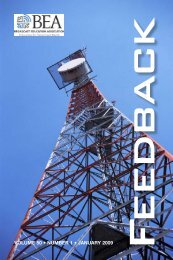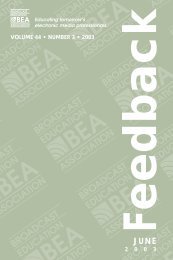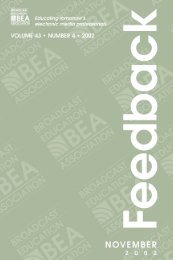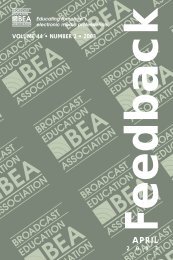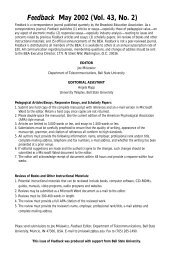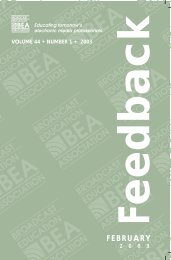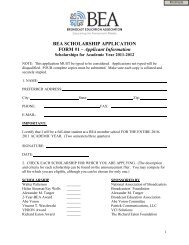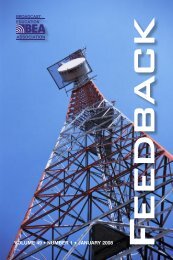PLANNING FOR GROWTH IN YEARS OF RESTRICTED RESOURCES
Feedback September 2003 - Broadcast Education Association
Feedback September 2003 - Broadcast Education Association
Create successful ePaper yourself
Turn your PDF publications into a flip-book with our unique Google optimized e-Paper software.
ule, U.S. Supreme Court rules,” Entertainment Law Reporter, Vol. 3, No. 6, Aug. 15,1981, p. 5).In 1994 and 1999, major decisions were made concerning Section (a)(7) of the TheCommunications Act of 1934. In the 1994 Declaratory Ruling, the FCC attempted toclear up ambiguities in its interpretation of Section 312(a)(7). The ruling held:1. Limitations and flat bans on the kinds and lengths of time offered to commercialadvertisers during the year preceding a particular election period were prohibited;and2. program time in the lengths programmed by the station in the year preceding aparticular election, regardless of whether offered to commercial advertisers, mustbe made available (Philip J. Gutwein II, “The FCC and Section 312(a)(7) of theCommunications Act of 1934: The development of the ‘unreasonable access’clause,” Federal Communications Law Journal, Vol. 53, No. 1, Dec. 2000, p.176).The ruling also foreclosed the possibility that broadcast stations would have to siftthrough the technical and contractual complications associated with the sale of oddlengthcommercial time should a qualified candidate request such time sufficiently far inadvance. The ruling also suggests anything from an hour-long documentary to a 30-second promo might be the equivalent time frame for access by federal candidates.In 1999, the FCC issued another ruling that was close to the standard that theCommission had embraced in the early 1980s—the standard that required broadcaststations to cater to the individual demands of qualified federal political candidates. Inother words, broadcasters could not refuse time on the ground that the station does notsell or program such lengths of time. The 1999 Memorandum Opinion and Orderrequired that broadcasters take part in full-scale negotiation and compromise everysingle time a federal candidate wants to purchase time (Gutwein, 2000).Throughout the 2000 election cycle the policy sided with the 1999 MemorandumOpinion and Order. However, the definition of reasonable access still seems a bitambiguous. The term “reasonable” appears contradictory to the 1999 document;broadcasters must attempt to meet every need of a federal candidate. Is this policyreasonable?Current policyCongress once again changed the direction of this issue when it inserted a rider intothe conference report for an appropriations bill (H. R. 4577, Department of Labor,Health and Human Services, and Education and Related Agencies Appropriations Act,2001). The House acted December 15, 2000. It became Public Law No. 106-554 onDecember 21st. Section 148 of the new law amended the guiding phrase by insertingthe phrase “other than a noncommercial educational station.”The revised Section 312(a)(7) now reads that the FCC may revoke a license orconstruction permit . . .“...for willful or repeated failure to allow reasonable access to or permitpurchase of reasonable amounts of time for the use of a broadcastingstation, other than a noncommercial educational broadcast station, by alegally qualified candidate for federal elective office on behalf of hiscandidacy.”BEA—Educating tomorrow’s electronic media professionals 42



